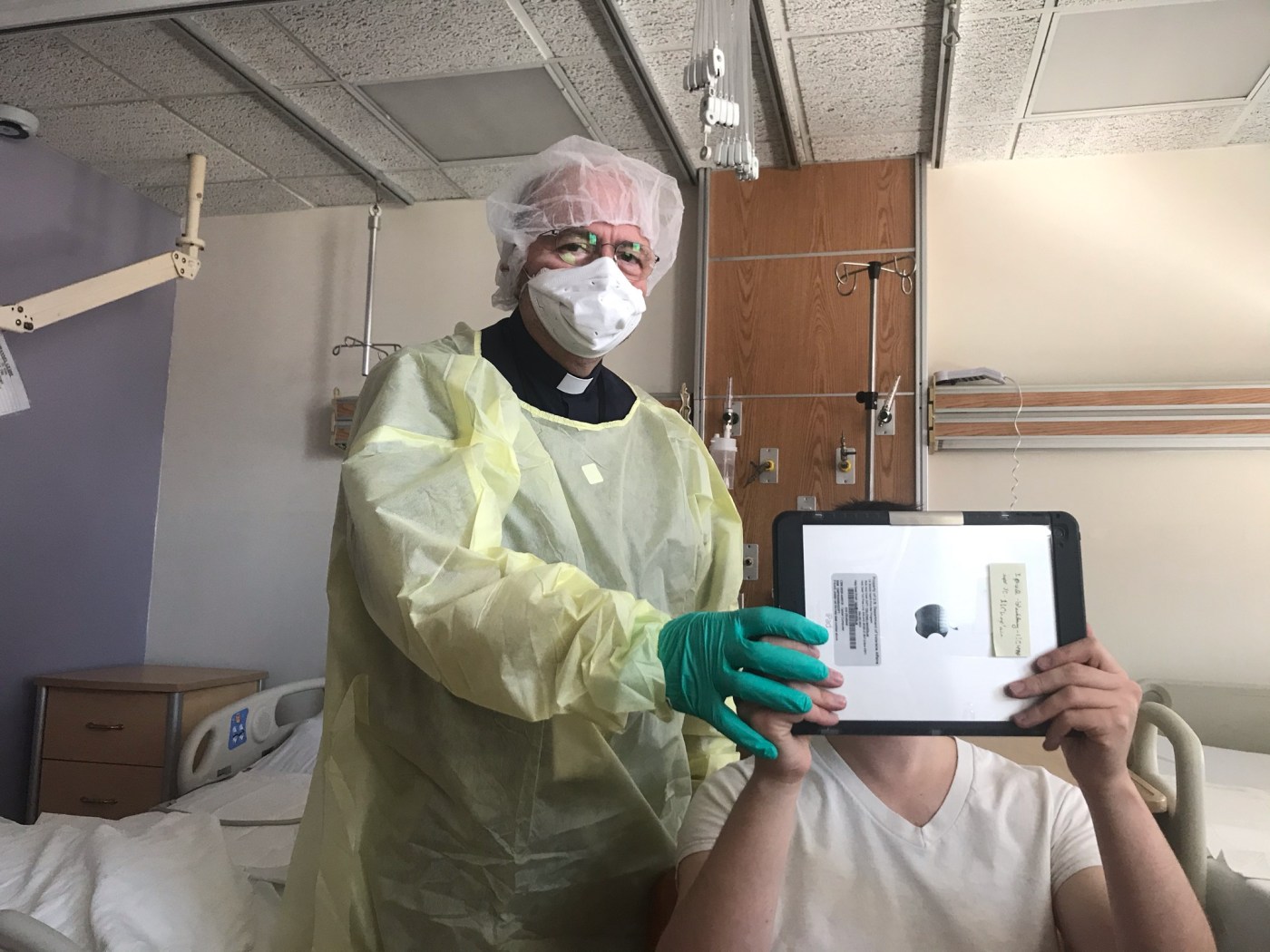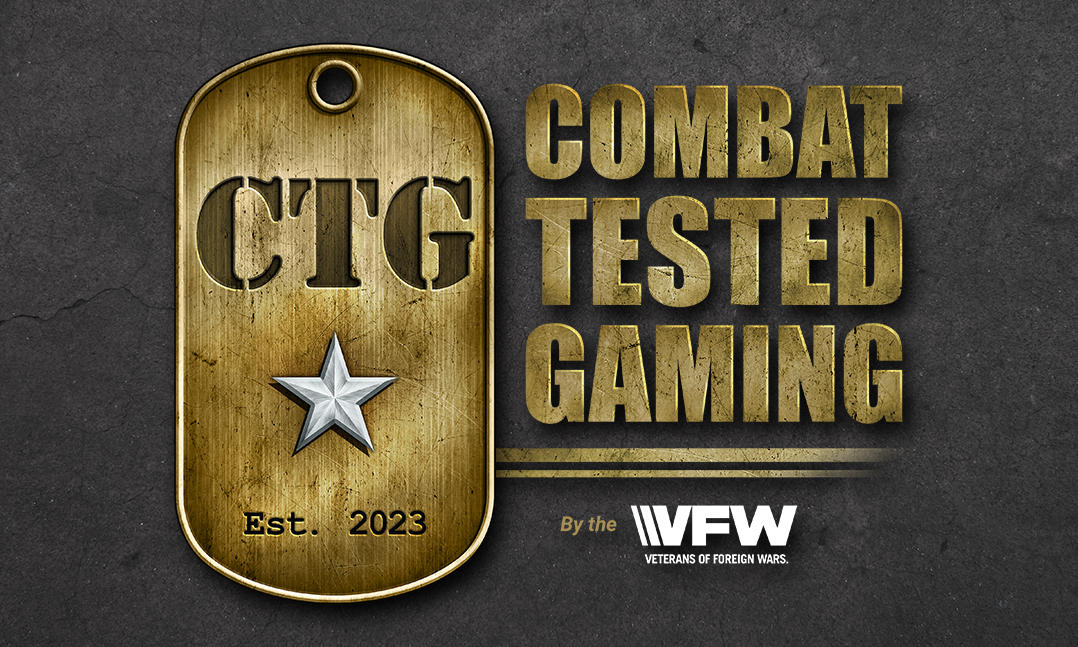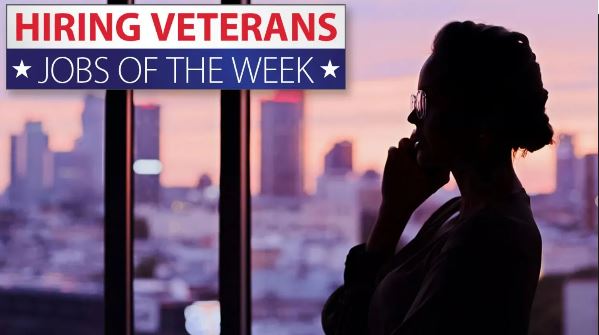VA facility chaplains provide comfort, counsel, and connections to families by leveraging technology at VA Community Living Centers. For Veterans living in these home-like assisted care centers, the temporary halt of in-person visits has prompted the use of tech to see family and friends.
While VA Chaplains provide as much personal comfort as they can to Veteran patients, Chaplain Jason Riggs and many other VA Chaplains are keenly aware of the positive impact that stems from family and community connections.
VA chaplains understand the value of personal connections. They’re trained to provide counsel and comfort to Veteran patients in challenging and distressing times, to seek out new ways to facilitate those connections. Now, they’re leveraging video calling or conferencing applications on phones, tablets, and laptops to connect CLC and other patients with their loved ones who are unable to visit.
“Especially those with dementia—they don’t understand why family aren’t visiting,” said Riggs, who serves patients at the W. G. (Bill) Hefner VA Medical Center in Salisbury, NC. “Sometimes the elderly go to nursing homes, and they begin to think their lives are worthless or meaningless. To help them to connect with something that give their lives meaning, there’s a lot of healing in that.”
The New York “Andrews”
The chaplains at the VA New York Harbor Healthcare System, St. Albans campus, Andrew Scheer and Head of Chaplains Andrew Sioleti, who call themselves “The Andrews,” are no strangers to the restrictions on visitation. The restrictions have led to a boost in creativity, of leveraging technology to facilitate family connections. For one patient accustomed to seeing his wife every day, chaplains are now helping to facilitate FaceTime conversations simply by answering the phone.
“The patients are not necessarily technologically savvy,” said Chaplain Sioleti, who has received requests from family to help enable a video call. In order to make these calls possible, Sioleti, Scheer, Riggs and others are careful to follow protocols for infectious disease, including wearing personal protective equipment and properly cleaning devices between uses. By doing so, they can continue their ministry to VA CLC residents and patients, as well as the families who miss them dearly.
“Our ministry doesn’t end at the gates of the CLC, it goes all the way out into the community,” said Scheer, noting that the comfort of these video calls or conferences is not just for the Veteran, but for the families as well.
Silver lining: Families realizing the value of video calls
In some cases, the technology enables “family reunions” that might not have been possible. Both Riggs and Chaplain Alejandro DeJesus, a chaplain at the South Texas Veterans Health Care System in San Antonio, have leveraged Zoom conferencing, which allows for multiple participants in a video conversation. Riggs facilitated one such conversation with a Veteran, his three children, and seven or eight grandchildren from around the country.
“They hadn’t seen each other in a long time, and they were telling stories about their granddad and what they remembered from their childhood,” said Riggs. “This is opening up some avenues that hadn’t been open before.”
DeJesus has also facilitated family meetings over Zoom, both for comfort and connection as well as coordination of care. DeJesus and other chaplains noted that the technology has been “enabling,” and not a hindrance, and that perhaps there are long-term uses of communication technology in palliative care or hospice care settings.
“I’m sure it would have been nicer for them to be face to face, but the technology did not dilute the emotions that they needed to share and show to each other. It was powerful. Even the providers became emotional,” said DeJesus, who himself became emotional relaying a story of a husband and wife using communication technology to say their final good-byes.
“She said it would have been harder for her face to face,” recalled DeJesus, who reports that technology wasn’t an obstacle to this conversation or others. “It was a big help. It’s not all artificial or superficial.”
Chaplain tech support
While using communication technology is not typically in the job description of a hospital chaplain, most have been quick and adept at initiating FaceTime, Zoom, or Google Duo conversations between patients and their families. In some cases, they needed to locate or acquire the appropriate equipment and test different applications to ensure stable or consistent conversations.
Chaplain Rochelle Binion, of the Royal C. Johnson Veterans Memorial Hospital in Eastern South Dakota, reported that members of the Sioux Falls leadership team loaned their MiFi hotspots to ensure that parts of the inpatient and CLC had strong WiFi to support the calls. She has used facility iPad tablets and laptops to facilitate conversations using both Google Duo and the hospital’s telehealth application. For older Veterans who may be hard of hearing, the audio quality on the laptop using the telehealth application seemed to fit the bill.

A Veteran patient at the Sioux Falls VA Community Living Center connects with family during a video chat with help from VA Chaplains.
Chaplain Binion helped connect a 98-year-old World War II Veteran who she says, “didn’t look at day over 75,” but who was unfamiliar with communication technology like FaceTime or Google Duo. He “really thrived on family,” and Binion and others at Sioux Falls wanted to help connect him with his family. With the help of his grandson, Binion connected the Veteran with his 70-year-old daughter—who also did not have significant experience with technology and who hadn’t been able to visit in months.
“He said it was ‘Pretty amazing stuff for a guy that remembers the horse and buggy days!’” recalled Binion.
Technology gurus
When most Veterans think of their experience with VA Chaplains, they think of warm and friendly confidants who might counsel patients before surgical procedures, offer spiritual guidance, or provide comfort to distraught families.
Many VA Chaplains now wear the moniker “technology gurus.” None will take singular credit, of course, giving thanks to nurses, IT staff, medical support assistants, and others like Christy Burson, who helped chaplains at the Roseburg VA Health Care System in Oregon get the tools they needed to make these virtual connections.
She and others have also helped support local protocols like developing systems for checking out or cleaning tablets to ensure that they are available for all to use.
“The Veterans are really enjoying it,” said Burson, “And the staff can see how it is impacting them.”
“Challenges in life are what often strengthen us and equip us with gaining new skills and increased confidence. VA Chaplaincy, like other aspects of VA, has been challenged to think-outside-the-box, be innovative, and be creative in the manner of providing spiritual care, which has included an increased use of virtual spiritual care for Veterans as well as virtual worship services.
As the National Director of VA Chaplain Service, I am incredibly blessed by the passionate devotion of VA chaplains and VA staff at large, innovatively coming together in our shared missions of Veteran care,” said Chaplain Juliana Lesher, National Director of Chaplain Service.
Topics in this story
More Stories
VFW’s Combat Tested Gaming tournaments bring together Veterans, active duty personnel and the gaming world.
How much do you know about VA care, benefits and services? Don’t miss out on what you've earned—check out the "2025 VA Federal Benefits Guide for Veterans, Dependents, Survivors, and Caregivers" handbook to learn more.
Each week, we receive job announcements from employers and employment websites—including RallyPoint, RecruitMilitary, VetJobs and HireMilitary—looking to hire Veterans. This post contains links to job listings for the week of Jan. 13, 2025. Each week, we’ll continue to post relevant and timely listings as we receive them, and for the locations listed.







I want chaplain help with my personal life PLEASE.. I’m involved in a long distance relationship and it’s being straightened because of this virus.. I’ve had to rebook 2 times now to see her… Help PLEASE
Appointments for community Care does not include transportation.
Some appointments are going to have to be canceled.
Trip VA request not covered
Cost out of pocket is over $100.00
How is it I have no VA organizations to help me with this? County not able to help . I may have to have my sister come from another state for short period to help . No one here in MN to help.